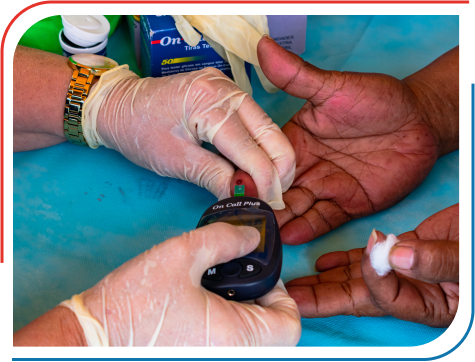Home » Speciality » Diabetology
Best Diabetes
Hospital in India
Wockhardt Hospitals is renowned for providing exceptional quality in diabetes surgery, ensuring reliability and consistently achieving positive outcomes.

Why Choose Wockhardt Hospitals
for Diabetes Surgery & Treatment?
At Wockhardt Hospitals, we understand that diabetic patients look for the best hospitals, which is why we have incorporated the top healthcare services at affordable rates. We provide end-to-end diabetes treatment facilities to all our patients. With an experience of over 25 years, our Medicine Department helps you to manage diabetes and other endocrine diseases.
Our experienced and board-certified diabetologists diagnose patients by conducting various tests and suggest an effective line of treatment accordingly. Diabetic Management advised by our doctors involves medications, a controlled diet, exercise, surgery, etc. We use an interdisciplinary model for delivering extensive management of endocrine disorders for diabetic patients. Also, the Wockhardt Hospitals’ research team is actively involved in researching more about diabetes. Living with diabetes can be difficult, but Wockhardt Hospitals can help you control it and make your life better.
Renowned Diabetologists
at Wockhardt Hospitals
- Mumbai Central
- Mira Road
- Nagpur
- Rajkot
What is Diabetes?
Diabetes is a common chronic condition that can be found in people of all ages. This health condition arises when the blood glucose level in your body increases rapidly. Diabetes develops when your pancreas does not produce sufficient or no insulin at all. It also occurs when your body does not respond properly to the insulin produced in your body. Most of the diabetes forms are chronic, while some are manageable. Diabetes can affect blood vessels, nerves, eyes, kidneys, and heart, if not treated on time. The field associated with this condition is known as diabetology, and the specialists who cure diabetes are called Diabetologists.
Signs and Symptoms
of Diabetes
Signs and symptoms of diabetes depend on the blood sugar level in your body. Some common diabetes symptoms are:
- Polydipsia (increased thirst)
- Dry mouth
- Vaginal or skin infections
- Unclear vision
- Numbness in your feet or hands
- Fatigue
- Non Healing wounds
- Weight loss
- Frequent urination
Though these are the common diabetic symptoms, there are some other symptoms also depending on the type of diabetes you have. People with prediabetes and gestational diabetes may not show any signs or symptoms. On the other hand, symptoms of type 1 and type 2 diabetes can be severe. These signs include:
- Vomiting
- Stomach pain
- Heavy breathing
- Breath with a fruity smell
- Darkened skin
If you experience any of these symptoms, contact your healthcare provider immediately. The earlier the diagnostic tests, the sooner the treatment can begin. If you have already been diagnosed, you will need to have regular medical follow-ups to stabilize your blood sugar level.
Main Causes
of Diabetes
The causes are different for different types of diabetes.
Causes of type 1 diabetes are:
- Destruction of insulin by the immune system (autoimmune disease)
- Changes in genes
- Attack of viruses

Causes of type 2 diabetes include:
- Insulin resistance
- Hormonal imbalances
- Physical inactivity
Causes of gestational diabetes are:
- Family history and genes
- Insulin resistance
- Overweight
- Damage to pancreas
Who is a Candidate
For Diabetes Surgery?
While diabetes surgery can completely change a patient’s life, it is not an option for everyone with diabetes. The following are some significant considerations that doctors take into account:
- Type 2 diabetes: Surgery cannot be an option for the treatment of type 1; however, in some forms of the disease, especially where other modes have not been adequate to treat patients with Type 2, it can deliver high success rates.
- BMI of 35 or higher: A BMI of 35 is generally regarded as the threshold for surgery, but age and general health should still be taken into account.
- Uncontrolled blood sugar: Despite trying lifestyle changes and medications, if blood sugar levels remain consistently high, surgery might be an option.
- Severe complications: If diabetes has already caused significant damage to organs like kidneys, eyes, or nerves, surgery may help prevent further complications.
- Commitment to lifestyle changes: Success after surgery requires long-term lifestyle changes like healthy eating and exercise.
Ultimately, the decision of whether or not to pursue diabetes surgery is a complex one that should only be made in consultation with a healthcare team. It is important to remember that surgery is not a one-size-fits-all solution, and there are many other effective ways to manage type 2 diabetes.
Types of Diabetes
The three main types of diabetes are as follows:
- Type 1 diabetes - It is also known as type 1 diabetes mellitus or juvenile diabetes. This type of diabetes is generally diagnosed in younger adults, teens, and kids. It is a chronic autoimmune condition in which your body produces less or no insulin that converts glucose into energy. The condition is not common in all people and is diagnosed before 40 years of age. Type 1 diabetes is caused by viral infections, genetic mutations, etc. People with this condition are advised to take insulin every day, do physical activities, have a balanced diet, and check blood sugar levels timely.
- Type 2 diabetes - This is the most common form of diabetes. Type 2 diabetes leads to insulin resistance. In this condition, the body cells do not respond to the insulin produced and are unable to maintain normal blood sugar levels. The condition is diagnosed in adults, teens, and children. Type 2 diabetes can be caused due to improper eating, being overweight, hormonal imbalances, and more. However this condition can be managed if patients are involved in physical activities, have a balanced diet, take insulin regularly, and get frequent health check-ups.
- Gestational diabetes - This type of diabetes occurs in pregnant women who never had diabetes. If you have gestational diabetes, then your baby is at a higher risk of getting health problems. It is caused when your body does not make an adequate amount of insulin during pregnancy. Usually, gestational diabetes goes away after the baby is born, but the chances of getting type 2 diabetes increase. To avoid this type of diabetes, you must lose weight before you get pregnant and get blood tests done.
Besides these types of diabetes, there is one more type known as prediabetes. In this condition, the blood sugar level is higher than normal but lower than the level diagnosed in type 2 diabetes. Prediabetes can lead to stroke, heart disease, and even type 2 diabetes. You must take healthy steps to prevent this type of diabetes.
What are the Tests Required
For Diabetes Surgery?
Diabetologists perform different tests for diabetes diagnosis, prediabetes, and diabetes. They will recommend the type of test after examining the diabetes symptom. Some of the diabetic tests are-
- Fasting Plasma Glucose (FPG) test - This test is done to check the blood glucose level after fasting overnight.
- Oral Glucose Tolerance test (OGTT) - This test requires fasting. The patient is asked not to eat for at least 8 hours before the test. In this test, the patient is given a glucose solution, and after two hours, his blood sample is taken to measure glucose levels. OGTT tells how your body metabolizes glucose.
- Hemoglobin A1C (HbA1c) test - This test measures the blood sugar level over the past three months.
| Diabetic tests | Normal | Prediabetes | Diabetes |
|---|---|---|---|
| FPG (mg/dL) | Less than or equal to 99 | 100 to 125 | More than or equal to 126 |
| RPG (mg/dL) | N/A | N/A | More than or equal to 200 |
| OGTT (mg/dL) | Less than equal to 139 | 140 to 199 | More than or equal to 200 |
| A1C (%) | Below 5.7 | 5.7 to 6.4 | More than or equal to 6.5 |
Key Aspects of
Diabetes Treatment
Acquiring healthy habits will help you in diabetes or sugar treatment and its management. Some key aspects of diabetes treatment are:
- Patients with type 1 and type 2 diabetes must take insulin through injections or pumps to maintain blood sugar levels.
- Take medications that help you manage your sugar levels. You can take tablets that stimulate your pancreas to produce enough insulin.
- If your body can't handle the effects of medications, then you can manage diabetes by having a proper diet. Make healthy choices and avoid taking too many milk products, starches, and carbohydrates.
- Excessive weight is one of the factors that can make your diabetic condition worse. To avoid this, you should get involved in physical activities. Go for a 30-minute walk or do cardio exercises and meditation. This will make your body fit.
- Follow the sugar treatment plan given by your doctor. You must check and record your blood sugar levels. Also, go for a medical check-up or follow-up timely.
How to Live a Healthy Lifestyle
and Treat Diabetes at Home?
Managing your diabetes by keeping your blood sugar levels in the recommended range can let you live a healthy lifestyle.
Following are some tips that can help you treat diabetes at home.
- Nutritious food - Healthy eating leads to a healthy lifestyle. Food affects blood sugar levels; therefore, your every meal should be balanced. Avoid consuming too many carbohydrates or proteins. Rather, have a good mix of vegetables, fruits, fats, proteins, and carbohydrates.
- Physical exercises - Indulge yourself in physical activities so that your body can produce insulin more efficiently. Ask your doctor for an exercise plan and strictly adhere to it. Most importantly, keep yourself hydrated while working out.
- Avoid taking stress - Taking too much stress might increase blood sugar levels. Have control over stress and do meditation to keep your mind relaxed.
What are the
Risk Factors For Diabetes?
Risk factors also depend on the type of diabetes.
Risk factors for type 1 diabetes are
- Age
- Family history
- Genetics
Risk factors for type 2 diabetes include:
- Prediabetes
- Being overweight
- Are 45 years and older
- Family history
- Physically inactive
- Had gestational diabetes when pregnant
Risk factors for gestational diabetes are:
- Have excessive weight
- Have PCOS (polycystic ovary syndrome)
- Family history
- Age being 25+
- Had gestational diabetes during a previous pregnancy.
Diabetes
Surgery Procedure
While lifestyle changes and medication remain the cornerstones of type 2 diabetes management, for some individuals, surgery can offer a life-changing alternative. Let’s delve into the three key stages of diabetes surgery:
Before
Surgery
- Evaluation: This thorough assessment involves medical history, physical examination, blood tests, and imaging scans to determine if you’re a suitable candidate.
- Nutritional counselling: Learning about new eating habits and portion control becomes important pre-surgery.
- Medications: Some medications may need to be adjusted to optimise blood sugar control.
During
Surgery
- Minimally invasive techniques: Minimally invasive techniques are employed, with most procedures being laparoscopic. This involves using small incisions and tiny instruments inserted through a tube, which helps reduce pain and recovery time.
- Anaesthesia: General anaesthesia ensures comfort throughout the procedure.
After
Surgery
- Hospitalisation: Depending on the procedure, hospital stay can range from 2-5 days.
- Pain management: Medication and supportive care helps address any discomfort.
- Dietary restrictions: A liquid diet initially transitions to soft foods and gradually progresses to regular meals with smaller portions.
- Nutritional supplements: Vitamins and minerals may be needed to compensate for changes in absorption.
- Follow-up care: Regular doctor visits are essential to monitor blood sugar, weight, and overall health.
- Lifestyle changes: Continued commitment to healthy eating, regular exercise, and stress management is key to long-term success.
FAQs on Diabetes Surgery
Q. What is the final stage of diabetes?
The final stage of diabetes is often characterized by serious complications such as renal failure, nerve damage, blindness, cardiovascular disease, and amputations owing to poor circulation. To avoid further deterioration and increase the quality of life, this phase is critical and it requires very careful supervision.
Q. Can diabetes surgery help with weight loss?
Yes, patients with type 2 diabetes may observe great results by having weight loss surgery like gastric bypass or a sleeve gastrectomy. Following these procedures, patients typically lose weight, which improves blood sugar regulation, lowers their need for medication, and occasionally even results in diabetic remission.
Q. How long does it take to recover from diabetes surgery?
Depending on the kind of surgery and the patient’s condition, recovery following diabetes surgery varies. Usually, patients are able to get back to their normal life within a few weeks. However, it may take anything between several months and a year for a full recovery, which includes stabilizing blood sugar levels.
Q. How long does a diabetic person live?
A diabetic’s lifetime can be nearly normal with proper care, depending on their unique circumstances. The life expectancy of people with type 2 diabetes is often lower than that of individuals without the disease.
Q. Can diabetes be cured?
No, diabetes cannot be cured permanently, but it can be managed. Consult your doctor and know which type of diabetes you have. Based on your test results, your healthcare provider will provide you with medical management to maintain your blood sugar levels at home.
Q. What is the best surgery for diabetics?
People with type 2 diabetes with a body mass index of 35 or more are advised to have bariatric surgery, either a gastric bypass or a sleeve gastrectomy.
Q. Is type 2 diabetes 100% reversible?
Although there is no treatment for type 2 diabetes, individuals with the condition may see a recovery of normal glucose levels. They can achieve and maintain normal blood sugar levels without medicine by making dietary adjustments and losing weight.
Q. Who is at risk for diabetes?
People having the following conditions are at risk for diabetes:
- Are 45 years and more
- Have parents or siblings with diabetes
- Are overweight
- Had gestational diabetes during a previous pregnancy
- Prediabetes
- Hormonal imbalances
Q. What is the normal sugar level by age?
The normal sugar level by age is:
- For adults – 90 to 130 mg/dL
- For children aged between 13 to 19 years old – 90 to 130 mg/dL
- For children aged between 6 to 12 years old – 90 to 180 mg/dL
- For children under 6 years old – 100 to 180 mg/dL
Q. Is Wockhardt Hospitals the best for diabetes treatment in India?
Yes, Wockhardt Hospitals are the best for diabetic management in India. The hospital’s diabetology department provides high-quality treatment options to patients. Top diabetologists diagnose patients and provide them with the right diabetes treatment plan. Also, the hospital’s medical staff offers end-to-end support during the treatment.
Q. What is the Diabetes Surgery Cost at Wockhardt Hospitals?
Diabetes surgery at Wockhardt Hospitals might cost between one lakh and four lakhs. However,
this cost may vary if the patient has other associated medical conditions. If so, further expenses
could be needed to stabilise the patient’s condition, and there may be additional charges.
Q. What is the success rate for Diabetes Surgery in India?
The majority of patients undergoing diabetic surgeries are successfully treated, with a success rate of 85% to 90%. It can also reduce mortality rates by 89%. Additionally, 10-15% of individuals may experience a significant decrease in their medication intake.

























